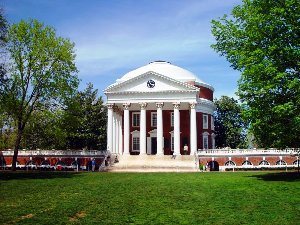Introduction
In the fall, Thomas Jefferson’s village stretches out before you. The tops of the maple and ash trees lining the evergreen lawn burn with the reds, oranges, and yellows of the East Coast fall. The graceful lines of their trunks are echoed in the rows of white colonnades that frame the lawn and announce the historic pavilions and rooms, still living quarters for popular faculty and honored students. Everywhere, the vast expanse of grass is dotted with picnickers, students studying, mini football games, and picture-snapping tourists. Yet your gaze is drawn past all of this to the north end of the lawn, to the building commanding the entire scene, the world-famous Rotunda. Based on the Roman Pantheon, the sparkling marble of its flowing staircase and regal columns and the elegant arc of its majestic dome ensure that the Rotunda is not only a historical landmark, but one of the most beautiful structures ever to grace a college campus.
bq, As I walk to my dreaded test, I smile as I remember that by the time I get out of class, the sun will have set and warm yellow light will be glowing within the many windows surrounding the lawn. I know that on my walk home, I’ll feel more like a lucky tourist after closing time than an undergraduate headed to the dining hall.
Amazing aesthetics, however, is not the reason why UVa has long been known as the “Public Ivy,” and why it attracts so many exceptional students and professors. Founded by Thomas Jefferson in 1819, UVa remains one of the highest ranked state-funded institutions in the nation. Offering undergraduate programs in architecture, arts and sciences, commerce, education, engineering and applied science, and nursing, the university continues to operate on its founder’s belief in the importance of a solid liberal arts education. Of its 20,380 enrolled students, two-thirds are undergraduates, and while offering the opportunities and diversity of a medium-size school, UVa still has a fairly concentrated main campus area, creating a smaller community feel. In other words, it will be virtually impossible to walk to class without recognizing at least a few faces. The central campus area has 1,166 acres and fifteen libraries. (The overall size is 3,392 acres, with 535 buildings.) Many students and professors also take advantage of the extraordinary new Albert and Shirley Small Special Collections Library, which houses numerous rare historical books and items and also boasts one of the most extensive collections of Thomas Jefferson’s effects and documents in the world. Although steeped in history and tradition, UVa remains on the cutting edge of technology, offering computerized library services, Internet access, and a variety of resources, including mainframes, minicomputers, PCs, and a network of printers, which are available to students at the many computer labs around grounds. Courses that use a variety of software for collaboration to enhance class communication are quite common. Special learning facilities at UVa include a learning resource center, an art gallery, radio and TV stations, and an art museum.
Attending UVa is more than just going through the motions of four years of tests, papers, and parties. It is an experience that will completely consume you. You will be a first-year instead of a freshman, you will live on-grounds instead of on campus, you will be able to write the honor pledge in your sleep, you will learn “The Good Old Song,” and you will come to recognize Thomas Jefferson as some sort of deity. At the end of it all, you will be welcomed into one of the most close-knit, active, and supportive alumni networks in the country. But most important, you will have interacted with top-notch professors and students, will have been a part of Jefferson’s still thriving vision of public education, and you will have done it all without you or your parents having to face the increasingly terrifying price tag of a private institution.
So ask yourself, why would you want to attend UVa? Because of its high rankings, its rigorous standards, and its feasible tuition? Obviously. Because you would have the chance to take a poetry seminar with former U.S. poet laureate Rita Dove, or a class on race relations from civil rights activist Julian Bond, or a political science lecture with renowned political analyst Larry Sabato? Of course. Because of the academic opportunities, including honors programs, student-run newspapers, magazines, and radio stations? Absolutely. Or even because of its outstanding Office of Career Planning and Placement, which offers internships, externships, résumé and job search guidance, and even arranges interviews with major companies on grounds? Positively. Maybe because of the richness of UVa’s history and tradition, from its creation by one of the most important men in America’s past to its unique continuation of distinguished customs such as the student-run honor system or the benevolent and mysterious secret societies? Definitely. Is it because the school is located in the heart of a charming city from which you can drive for ten minutes and be in some of the most beautiful, rural scenery in the country? Certainly. Aside from all of this, you realize that you want to attend UVa because of all the little things, from painting Beta bridge, or attending the Restoration Ball, to working for Madison House, or living in La Maison Française, which make any student who attends this university a member of a community and a part of an experience that stretches far beyond a four-year education.


